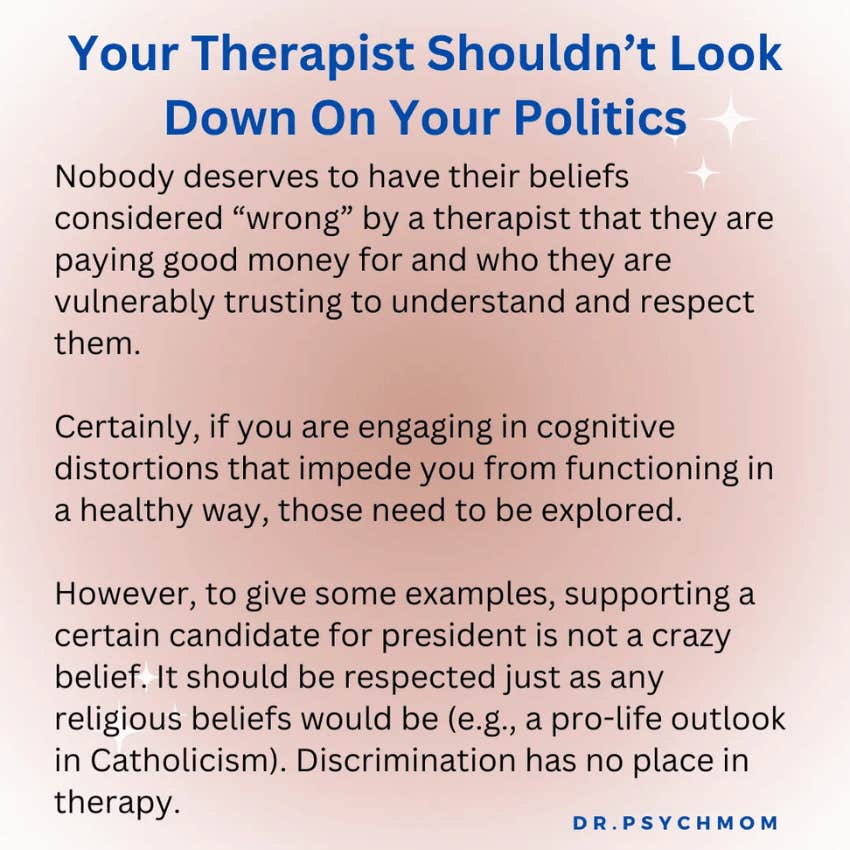Your Therapist Should Never Look Down On Your Politics
If you feel you “have to” espouse certain beliefs in therapy, therapy will not work.
 mediaphotos | Canva
mediaphotos | Canva Starting around the 2016 election, I started to observe that therapists on listservs and in therapist groups started to think about clients with more conservative (and/or moderate, and/or libertarian) political beliefs very differently. This was amplified by the pandemic when politics became further politicized.
Therapists should be able to empathize with clients of all political leanings, and I have been surprised by the fact that this seems to no longer be something to aspire to.
This post is for you if you have felt unheard by your therapist or perceive that your therapist is made uncomfortable by your politics or belief system.
 DrPsychMom
DrPsychMom
Many therapists say they cannot identify with and even refer out clients who have more conservative beliefs.
This is in contrast with how they would act toward people with different cultural backgrounds from their own. I find this difficult to reconcile with the fact that therapists are supposed to be the most empathic of people, who need to help their clients learn to take others’ perspectives (e.g., understanding their partner, their kids, etc).
How can you help someone learn how to be empathic if you, yourself, are intolerant? When working with couples with different political leanings, empathy is key. How can you promote this if you, yourself, cannot tolerate dealing with a client who is different from you?
Nobody deserves to have their beliefs considered “wrong” by a therapist that they are paying good money for and who they are vulnerably trusting to understand and respect them.
Certainly, if you are engaging in cognitive distortions that harm you and impede you from functioning healthily, those need to be explored. However, to give some examples, supporting a certain candidate for president or understanding the role of prior infection in COVID are not fringe/crazy beliefs. They should be respected just as any religious beliefs would be (e.g., a pro-life outlook in Catholicism). Discrimination has no place in therapy.
Before the 2016 election and the 2020 pandemic, it seemed that therapists were more willing and able to work with clients of all political leanings, but since then, there have been more therapists who discuss feeling personally triggered by clients with political beliefs that are not progressive or liberal.
There is no reason that anger about the 2016 election outcome should be considered understandable and anger about the 2020 election outcome should be considered pathological, although, unfortunately, I have seen this viewpoint expressed by therapists, particularly in coastal cities.
 SHVETS production | Pexels
SHVETS production | Pexels
If you feel that your therapist’s political beliefs are informing their responses to you in an intolerant way and/or you are scared to broach your ideas in therapy because you feel that “all” therapists would not understand you, I certainly understand why you feel this way.
However, some therapists can still provide a genuinely non-judgmental space, like me. Can you imagine if your oncologist refused to work with you because you voted for Bernie Sanders?
This would be considered antithetical to the ethics of medicine. I don’t see why therapy would be different; if anything, we should be more open-minded than other practitioners, as empathy and therapeutic alliance are so integral to productive therapy.
It is a shame that a field predicated on empathy seems to be growing intolerant of competing worldviews. It is upsetting to me that clients should feel scared of expressing their political beliefs because they feel they might be treated as inferior or wrong by their own therapist. This is particularly relevant for couples, where the male feels that he is outside his comfort zone to begin with because he is not as comfortable with verbally dissecting emotions.
And then many therapists focus on the (more often) female goal of emotional closeness without the (more often) male goal of intimate closeness. The last straw maybe this guy’s wife and the therapist bonding about their politics, which diverge from his. In such a case, which is not uncommon, how can this man feel respected and heard? He will likely terminate treatment, which will leave the couple (and their kids, if any) in a much worse place.
Note that if you are a therapist who feels personally triggered or doesn’t know how to work with people who identify very differently than you do politically, please refer these clients out to more open-minded therapists.
It is admirable and ethical to know yourself and know when you can no longer help someone. However, it would also be fruitful to explore your intolerances in your own therapy, so that you may be able to work through them and be a more empathic and tolerant clinician moving forward.
Dr. Samantha Rodman Whiten, aka Dr. Psych Mom, is a clinical psychologist in private practice and the founder of DrPsychMom. She works with adults and couples in her group practice Best Life Behavioral Health.

